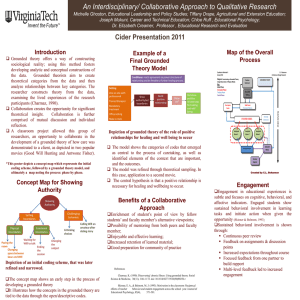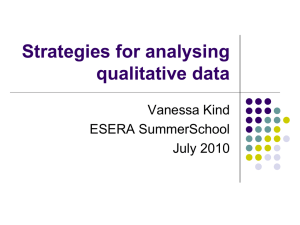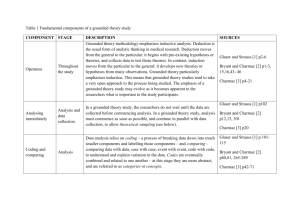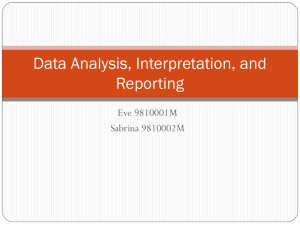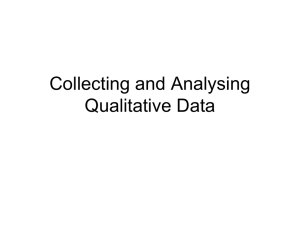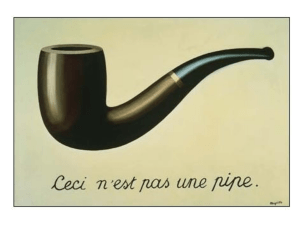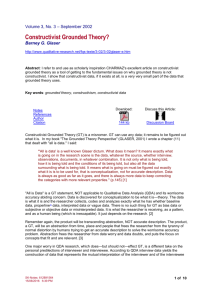2-page proposal file
advertisement
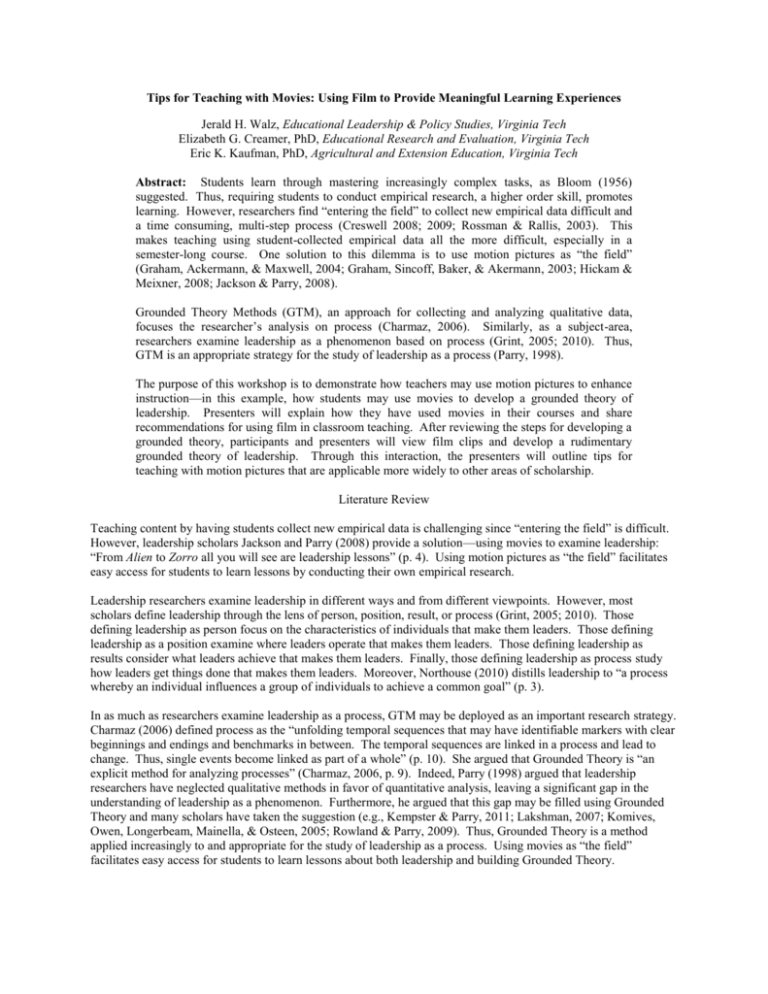
Tips for Teaching with Movies: Using Film to Provide Meaningful Learning Experiences Jerald H. Walz, Educational Leadership & Policy Studies, Virginia Tech Elizabeth G. Creamer, PhD, Educational Research and Evaluation, Virginia Tech Eric K. Kaufman, PhD, Agricultural and Extension Education, Virginia Tech Abstract: Students learn through mastering increasingly complex tasks, as Bloom (1956) suggested. Thus, requiring students to conduct empirical research, a higher order skill, promotes learning. However, researchers find “entering the field” to collect new empirical data difficult and a time consuming, multi-step process (Creswell 2008; 2009; Rossman & Rallis, 2003). This makes teaching using student-collected empirical data all the more difficult, especially in a semester-long course. One solution to this dilemma is to use motion pictures as “the field” (Graham, Ackermann, & Maxwell, 2004; Graham, Sincoff, Baker, & Akermann, 2003; Hickam & Meixner, 2008; Jackson & Parry, 2008). Grounded Theory Methods (GTM), an approach for collecting and analyzing qualitative data, focuses the researcher’s analysis on process (Charmaz, 2006). Similarly, as a subject-area, researchers examine leadership as a phenomenon based on process (Grint, 2005; 2010). Thus, GTM is an appropriate strategy for the study of leadership as a process (Parry, 1998). The purpose of this workshop is to demonstrate how teachers may use motion pictures to enhance instruction—in this example, how students may use movies to develop a grounded theory of leadership. Presenters will explain how they have used movies in their courses and share recommendations for using film in classroom teaching. After reviewing the steps for developing a grounded theory, participants and presenters will view film clips and develop a rudimentary grounded theory of leadership. Through this interaction, the presenters will outline tips for teaching with motion pictures that are applicable more widely to other areas of scholarship. Literature Review Teaching content by having students collect new empirical data is challenging since “entering the field” is difficult. However, leadership scholars Jackson and Parry (2008) provide a solution—using movies to examine leadership: “From Alien to Zorro all you will see are leadership lessons” (p. 4). Using motion pictures as “the field” facilitates easy access for students to learn lessons by conducting their own empirical research. Leadership researchers examine leadership in different ways and from different viewpoints. However, most scholars define leadership through the lens of person, position, result, or process (Grint, 2005; 2010). Those defining leadership as person focus on the characteristics of individuals that make them leaders. Those defining leadership as a position examine where leaders operate that makes them leaders. Those defining leadership as results consider what leaders achieve that makes them leaders. Finally, those defining leadership as process study how leaders get things done that makes them leaders. Moreover, Northouse (2010) distills leadership to “a process whereby an individual influences a group of individuals to achieve a common goal” (p. 3). In as much as researchers examine leadership as a process, GTM may be deployed as an important research strategy. Charmaz (2006) defined process as the “unfolding temporal sequences that may have identifiable markers with clear beginnings and endings and benchmarks in between. The temporal sequences are linked in a process and lead to change. Thus, single events become linked as part of a whole” (p. 10). She argued that Grounded Theory is “an explicit method for analyzing processes” (Charmaz, 2006, p. 9). Indeed, Parry (1998) argued that leadership researchers have neglected qualitative methods in favor of quantitative analysis, leaving a significant gap in the understanding of leadership as a phenomenon. Furthermore, he argued that this gap may be filled using Grounded Theory and many scholars have taken the suggestion (e.g., Kempster & Parry, 2011; Lakshman, 2007; Komives, Owen, Longerbeam, Mainella, & Osteen, 2005; Rowland & Parry, 2009). Thus, Grounded Theory is a method applied increasingly to and appropriate for the study of leadership as a process. Using movies as “the field” facilitates easy access for students to learn lessons about both leadership and building Grounded Theory. Goals and Objectives After completing this workshop, participants will be able to (a) summarize rationales for using movies in classroom instruction, (b) identify how some professors have used film in their courses to enhance instruction, and (c) describe some best practices for using film in classroom teaching. Description of Practice In this interactive workshop, the presenters will review the process of developing Grounded Theory described by Charmaz (2006). This process includes developing research questions, collecting data, coding conceptually using constant-comparative methods, writing embedded, analytical and extended memos, refining conceptual categories, applying theoretical sampling, diagramming theoretical concepts, and finishing a written Grounded Theory (Charmaz, 2006). Participants will receive a research question and view film clips designed to display a leadership practice or behavior. When watching the clips, participants will note important leadership behaviors or processes displayed by the main character. The group will develop a Grounded Theory of leadership using observations from the film clips. Based on this exercise, participants will derive the best practices for using film in course instruction. Discussion As students and professors, we have experienced both effective and ineffective uses of motion pictures in course instruction. Teachers show films to fill time, to provide examples or illustrate important points, or to push students into higher levels of learning. We have found movies helpful for allowing students to apply lessons from theory or to conduct their own research and analysis. Along the way, we have learned how to use films in ways that increasingly enhance traditional forms of instruction and provide meaningful learning experiences. References Bloom, B. S. (1956). Taxonomy of educational objectives: The classification of educational goals. New York: McKay. Charmaz, K. (2006). Constructing grounded theory: A practical guide through qualitative analysis. Los Angeles: SAGE. Creswell, J. W. (2008). Educational research: Planning, conducting, and evaluating quantitative and qualitative research. Upper Saddle River, N.J: Pearson/Merrill Prentice Hall. Creswell, J. W. (2009). Research design: Qualitative, quantitative, and mixed method approaches. Los Angeles: SAGE. Graham, T. S., Ackerman, J. C., & Maxwell, K. K. (2004). Reel leadership II: Getting emotional at the movies. Journal of Leadership Education, 3(3), 44-57. Graham, T. S., Sincoff, M. Z., Baker, B., & Ackermann, J. C. (2003). Reel leadership: Hollywood takes the leadership challenge. Journal of Leadership Education, 2(2), 37-45. Grint, K. (2010). Leadership: A very short introduction. Oxford: Oxford University Press. Grint, K. (2005). Leadership: Limits and possibilities. Basingstoke: Palgrave Macmillan. Jackson, B., & Parry, K. W. (2008). A very short, fairly interesting and reasonably cheap book about studying leadership. London: SAGE. Hickam, B. & Meixner, C. (2008). Transforming leadership: Film as a vehicle for social change. Journal of Leadership Education, 7(2), 41-46. Kempster, S., & Parry, K. W. (2011). Grounded theory and leadership research: A critical realist perspective. The Leadership Quarterly, 22(1), 106-120. doi: 10.1016/j.leaqua.2010.12.010 Komives, S. R., Owen, J. E., Longerbeam, S. D., Mainella, F. C., & Osteen, L. (2005). Developing a leadership identity: A grounded theory. Journal of College Student Development, 46(6), 593-611. Lakshman, C. (2007). Organizational knowledge leadership: A grounded theory approach. Leadership & Organization Development Journal, 28(1), 51-75. doi: 10.1108/01437730710718245 Northouse, P. G. (2010). Leadership: Theory and practice (5th ed.). Los Angeles: SAGE. Parry, K. W. (1998). Grounded theory and social process: A new direction for leadership research. The Leadership Quarterly, 9(1), 85-105. doi: 10.1016/S1048-9843(98)90043-1 Rowland, P. & Parry, K. W. (2009). Consensual commitment: A grounded theory of the meso-level influence of organizational design on leadership and decision-making. The Leadership Quarterly, 20(4), 535-553. doi: 10.1016/j.leaqua.2009.04.004
